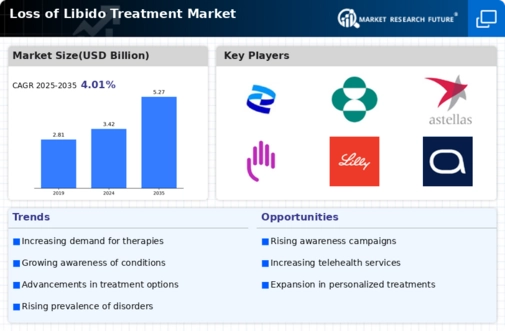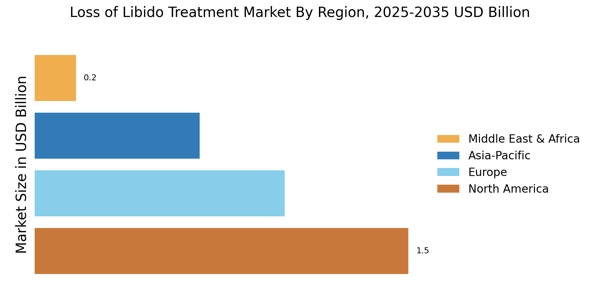Aging Population
The aging population is a significant factor influencing the Loss of Libido Treatment Market. As individuals age, hormonal changes and health issues can lead to decreased libido, particularly in older adults. It is estimated that by 2030, nearly 1 in 5 individuals will be over the age of 65, creating a larger demographic that may require treatment for libido-related issues. This demographic shift is likely to increase the demand for specialized treatments, including hormone replacement therapies and counseling services. Consequently, the industry may see a surge in innovative solutions tailored to meet the needs of this aging population.
Increased Focus on Mental Health
The growing emphasis on mental health and its connection to sexual health is driving the Loss of Libido Treatment Market. Mental health issues such as anxiety and depression are known to contribute to loss of libido, and as society becomes more aware of these links, there is a greater push for integrated treatment approaches. This trend is reflected in the rising number of mental health professionals incorporating sexual health discussions into their practices. The market is likely to benefit from this holistic approach, as more individuals seek comprehensive solutions that address both mental and sexual health.
Rising Incidence of Libido Disorders
The increasing prevalence of libido disorders among various demographics appears to be a primary driver for the Loss of Libido Treatment Market. Studies indicate that approximately 30% of men and 40% of women experience some form of sexual dysfunction, which often includes loss of libido. This growing incidence is likely to propel demand for effective treatment options. As awareness of these disorders rises, more individuals are seeking help, thereby expanding the market. The treatment landscape is evolving, with a variety of therapies being developed to address these issues, suggesting a robust growth trajectory for the industry.
Advancements in Pharmaceutical Research
Recent advancements in pharmaceutical research are significantly impacting the Loss of Libido Treatment Market. Innovative drugs and therapies are being developed to target the underlying causes of libido loss, including hormonal imbalances and psychological factors. The introduction of new medications, such as those that enhance blood flow or balance hormones, is expected to expand treatment options available to consumers. Furthermore, clinical trials and research studies are continuously providing insights into effective treatment modalities, which may lead to increased adoption of these therapies in the market.
Cultural Shifts Towards Open Discussions
Cultural shifts towards more open discussions about sexual health are contributing to the growth of the Loss of Libido Treatment Market. As societal norms evolve, individuals are becoming more comfortable discussing their sexual health issues, including loss of libido. This increased openness is likely to reduce stigma and encourage more people to seek treatment. Additionally, media campaigns and educational programs are playing a crucial role in raising awareness about available treatment options. As a result, the market may experience a rise in demand for various treatment modalities, reflecting changing attitudes towards sexual health.

















